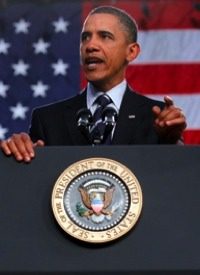
Despite the wave of popular anger over the ongoing recession (no, it hasn’t ended, as just about everybody outside the Beltway has figured out by now) and the enormous expansion of government debt that is sucking the private sector dry, President Obama is refusing to contemplate extension of the Bush tax cuts for America’s high earners.
Individuals earning more than $200,000 and households earning above $250,000 — which the Obama administration has arbitrarily determined to represent America’s “wealthy” — will, if the President has his way, return to paying the higher tax rates that were in force prior to 2001.This tax increase is expected to help defray the cost of yet another stimulus, although the White House is carefully avoiding calling it such. The latest program will feature a mixture of business tax breaks and spending on transportation infrastructure, and is supposedly valued at $180 billion.
Whether President Obama can afford politically to raise taxes on any sector under current economic conditions is debatable, but the White House is giving every indication it intends to turn the matter of the Bush-era tax cuts into divisive demagoguery. As the New York Times’ Jackie Calmes put it, “by proposing to extend the rates for the 98 percent of households with income below $250,000 for couples and $200,000 for individuals — and insisting that federal income tax rates in 2011 go back to their pre-2001 levels for income above those cutoffs — [President Obama] intends to cast the issue as a choice between supporting the middle class or giving breaks to the wealthy.”
True to form, President Obama, in a speech this afternoon in Cleveland, Ohio, laid the blame on Republicans for the ballooning federal debt. Noting that Republicans profess opposition to government spending, the president said:
When these same Republicans … were in charge, the number of earmarks and pet projects went up, not down. These same Republicans turned a record surplus that Bill Clinton left into a record deficit. Just this year, these same Republicans voted against a bipartisan fiscal commission that they themselves proposed. And when you ask them what programs they’d actually cut, they usually don’t have an answer.
The President has a point, although few hard-core Republican partisans will admit it: The GOP has shown itself to be just as addicted to Big Government programs and deficit spending as the Democrats, although they are generally more reluctant to raise taxes.
But beyond the political quibbling over how to tinker with tax rates and spend stimulus money looms a larger truth that almost nobody in the political class comprehends: Fiscal meddling can hinder the economy, but cannot heal it.
Even tax cuts, revered by supply-siders since the Reagan era, cannot in and of themselves lift an economy out of recession. What is killing the American economy is the size of government, period. It is Big Government that spends far more than it takes in — and then inflates the money supply to pay for it, triggering the boom and bust business cycle. It is also Big Government that imposes its dubious regulatory wisdom on free markets that need no political supervisors. Finally, of course, Big Government pays for as much of its extravagance as the electorate can be made to bear via direct taxation, never tiring of devising exotic new ways to collect revenue and keep the general public baffled and cowed.
The only thing that will heal the American economy will be deep reductions in the size of government. Cutting back the government — and this will mean eliminating entire bureaucracies and departments, like Education, that are neither constitutional nor serve any useful function — will reduce dramatically the cost of government, allowing taxes to be slashed (and, in the case of particularly noxious levies like the graduated income tax, eventually eliminated altogether) without running up deficits to cover revenue shortfalls. Cutting Big Government — really cutting it, not just trimming the edges — will entail clearing away the regulatory cobwebs that entangle most of the American productive sector, from agriculture to manufacturing. Finally, getting rid of Big Government will necessarily require ending the Federal Reserve system and returning to the fiscal discipline imposed by a precious metal monetary standard.
Needless to say, President Obama has nothing remotely like this in mind. Until political leadership emerges that is serious about reviving the economy by reducing the size of Big Government by an order of magnitude, the partisan debate over tax cuts will remain what it has been for the last few generations: eyewash for the taxpaying masses.
Photo: AP Images



